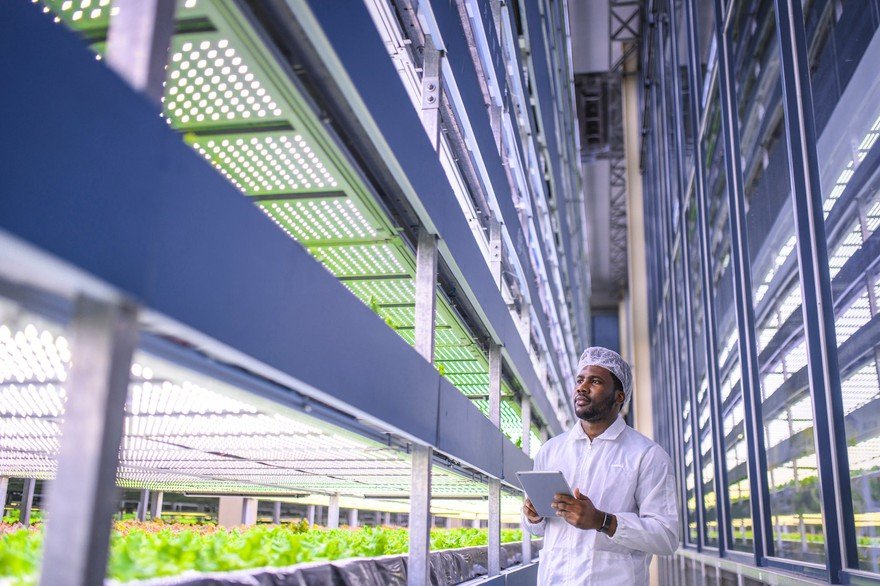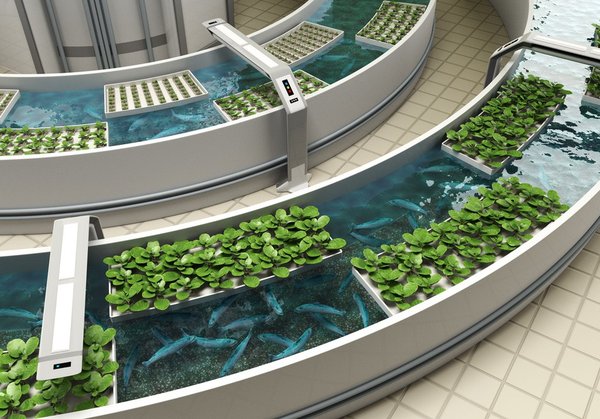With the global population continuing to expand, the world will need to double its food supply over the next three decades. That's a daunting task, especially as arable land for farming shrinks due to climate change, urban sprawl, and soil destruction. At the current pace, farmable land could fall 50% by 2050, making an already daunting challenge even tougher.
Since it's become more challenging to find additional farmland to meet our growing food needs, farmers are starting to go vertical. Here's a closer look at some of the agricultural companies focused on vertical farming.

Top stocks
Top vertical farming stocks in 2024
Vertical farming isn't a new technique. However, it's an emerging sector for those seeking more sustainable investments. There aren't too many publicly traded companies focused on the space yet, especially since a couple of notable ones have gone bankrupt in recent years. Here are some top options for investors to consider:
| Vertical Farming Stock | Ticker Symbol | Market Cap | Company Description |
|---|---|---|---|
| Realty Income | (NYSE:O) | $39.2 billion | A diversified real estate investment trust that's investing in developing vertical farms. |
| Village Farms International | (NASDAQ:VFF) | $94.7 million | A pioneer in controlled environment agriculture. |
| Hydrofarm Holdings | (NASDAQ:HYFM) | $44.8 million | A major manufacturer and distributor of controlled environment agriculture equipment and supplies. |
Here's a closer look at some of these indoor vertical farming stocks.
Realty Income
1. Realty Income
Realty Income isn't a pure-play vertical farming stock. It's a real estate investment trust (REIT) with a diversified portfolio that includes retail, industrial, gaming, and other properties. The REIT has a long history of investing in new property verticals to enhance its growth profile.
Vertical farming is one of its newer property verticals. In early 2023, Realty Income and Plenty Unlimited signed a strategic alliance. The REIT agreed to acquire and provide development funding for properties that will house indoor farms operated by Plenty. Realty Income committed to invest as much as $1 billion into the partnership.
The initial transaction saw the REIT acquire land and provide development farming for Plenty's first vertical farm campus near Richmond, Virginia. Plenty plans to eventually grow more than 20 million pounds of produce annually.
Village Farms
2. Village Farms
Village Farms International pioneered controlled environment agriculture in North America more than 30 years ago. The company is leveraging its experience to expand into new markets, with a focus on cannabinoid and related health and wellness markets.
Today, Village Farms grows produce on more than 200 acres across the U.S. and Canada. It also has producing partners in Canada and Mexico and owns produce distribution centers in Canada and Texas. The company sells its produce under the Village Fresh Farms brand. In addition to growing fresh produce, Village Farms also grows botanicals to produce cannabinoids for the recreational, medical, and health and wellness markets.
Hydrofarm Holdings
3. Hydrofarm Holdings
Hydrofarm Holdings manufactures and distributes hydroponic equipment and supplies for the controlled environment agriculture market, which includes vertical farming. The company's products include high-intensity grow lights, climate control solutions, and growing media. It focuses on the wholesale market, distributing its products to retailers from six centers in the U.S. and two in Canada.
The company has been actively expanding its portfolio by acquiring companies that manufacture complementary products. Hydrofarm Holdings aims to use its growing scale and financial strength to consolidate the highly fragmented controlled environment agriculture equipment and supply segment, positioning it to gain market share while it helps supply the fast-growing vertical farming market with the materials to keep expanding food production.
However, like many in the vertical farming sector, Hydrofarm Holdings has fallen on hard times in recent years. Its sales slumped in 2023, which forced the company to restructure by cutting costs. It hopes that the moves to improve its profitability will put its financials on a more sustainable foundation.
Related investing topics
Vertical farming stocks have a lot of promise (and risks)
Vertical farming could play a crucial role in helping to meet the world's growing demand for food, especially given the challenges of shrinking farmable acres. That sets investors up for a lot of growth as companies like Plenty and Village Farms expand their farming operations. The expected growth will also benefit equipment and supply makers such as Hydrofarm Holdings, as well as vertical farm developers and real estate investors like Realty Income. That makes these stocks interesting options for investors looking to get into this fast-growing space.
However, the sector is also quite risky. A couple of notable vertical farming stocks have declared bankruptcy in recent years due to unsustainable financials. Investors need to tread carefully when considering vertical farming stocks.
Vertical farming investment FAQ
Are any vertical farms publicly traded?
Most of the top vertical farms are private companies. Meanwhile, many of the largest publicly traded vertical farms have gone bankrupt, so there aren't currently any publicly traded vertical farms. However, there are a few public companies capitalizing on the vertical farm trend, including Realty Income, Village Farms, and Hydrofarm Holdings.
Can you invest in vertical farming?
You can invest in vertical farming. However, there aren't currently any pure-plan vertical farming stocks since they have either gone bankrupt or are still private companies. Instead, investors would need to consider companies capitalizing on the vertical farming trend like Realty Income, Hydrofarm Holdings, or Village Farms.
What is the biggest company in vertical farming?
Kalera has been the biggest company in vertical farming. However, it went bankrupt in 2023 and is in the process of liquidating.
Can vertical farming be profitable?
Vertical farming can be profitable. However, many vertical farming companies aren't profitable because they're spending heavily to expand their operations, including building new vertical farms.










